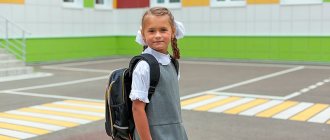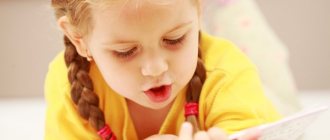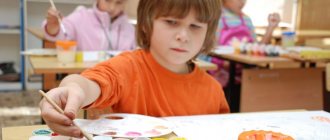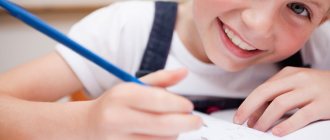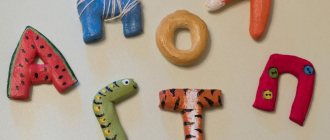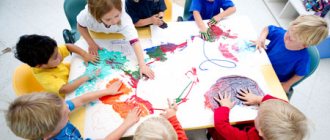Parents have differing opinions on how to properly prepare a future schoolchild for studying at home. Some are sure that the last summer before classes should be spent exclusively in relaxation, others load their child as much as possible so that in the future he will not lag behind his classmates. Only later does it turn out that some children become “overprepared” and are bored in class, others can count and read perfectly, but lose things and are completely unable to navigate the building of the educational institution, others read well in English, but have difficulty learning their own language or discomfort in communication. The list can be continued endlessly; primary school teachers have many similar stories. How to find a middle ground so that your child discovers a new stage in his life with interest?
Psychological readiness of the child for the school process
Psychological preparation for the school process of children is the most important. It is of enormous importance, regardless of what type of educational institution was chosen:
- Improving communication skills with other children, accepting oneself in the social position of the student. The experience gained reflects his personal maturity. Psychologists recommend entrusting this mission to professionals working in centers preparing children for the school process. The sooner parents turn to them, the more effective the result will be.
- The child must understand that when faced with difficulties, parents and a teacher will always be next to him, ready to help. Together we can cope with any task. Volitional maturity in the process of preparing a child is determined by his readiness to express himself and fulfill educational requirements.
- Intellectual maturity is very important for a child. It is determined by a quantitative vocabulary of words, knowledge about the world around us, the ability to analyze and build a logical chain. A prepared child is able to express his thoughts, complete teachers’ assignments, and communicate freely on topics that are familiar to him.
As if there was no preparation at all
There are many moments in our ordinary home life that can rightfully be considered preparation for school and which naturally fit into the life of any family.
Walking, skating, skiing, swimming - everything that improves health is very important for a child’s future school life. Encourage activities that develop thinking, imagination, and motor skills: drawing, modeling, designing, embroidering.
The best way to develop speech, attention, imagination, and memory is to read books to your child. Read every day, read even if your child already knows how to read. Your reading will not replace either watching cartoons or listening to tapes.
Cooperate with your child, do not refuse his help in adult matters: from repairing a faucet to making dumplings. Be prepared to help yourself if necessary.
Play games that have clear rules.
Pay special attention to the child’s desire to learn new things, the ability to communicate and find a common language with children and adults, the ability to overcome difficulties, and bring the job started to completion.
Skills and abilities that a future student must master
Below is a list of general requirements that every child who is about to cross the school threshold must meet:
- indicating your full name, your birthday and home address;
- know letters, navigate vowels and consonants, read short texts (at least syllable by syllable);
- know the differences between the seasons, be able to describe them (the vocabulary of words is determined);
- navigate the time of day;
- name the basic geometric shapes and be able to depict them;
- remember short texts, be able to retell it (diction and memory are determined).
The following skills should also be included in your preparation for school:
- correct behavior in public places;
- taking care of yourself without the help of adults, putting things in order in the workplace;
- description of what is shown in the picture;
- counts up to 20;
- names of color shades;
- answers to the questions: “who?”, “when?”, why?”;
- spending quiet time in class for 20-25 minutes;
- differences in direction “up”, “down”, “right”, “left”.
SAMPLE LIST OF KNOWLEDGE
To check how ready your baby is for the new stage of his life, you can check the following list of skills. Let us immediately note that the information is approximate, a child may know one thing, but not understand anything else - this is normal, because everyone’s abilities are different. But parents should take on board an approximate list of knowledge and skills.
By the age of 6, a child should know well:
- your full name, address (starting from country), date of birth and age;
- FULL NAME. parents, as well as where they work (there is no need to require the child to memorize the exact name of the company - the profession and the abbreviated name will be enough);
- names of animals and their offspring;
- vegetables, fruits, berries – be able to show them in pictures and in reality;
- give examples of wintering and migratory birds, garden and wild flowers, wild and domestic animals, explain how they differ;
- months of the year (what they are called, in what order they are located on the calendar, what month it is);
- primary colors and shades;
- alphabet - know the sequence of letters in the Russian language, what it looks like, what words it contains.
Some children also know the English alphabet, but this is not necessary.
A child should know all this before entering the doors of an educational institution for the first time.
Preparing for the school curriculum with a teacher
If a decision has been made to study at a specialized center for preschoolers, then parents need to pay attention to the following points when choosing an organization:
- Experience of teachers who are involved in working with children. Does the development center have a license to conduct educational activities? The number of students in the lesson, the interior of the room, the availability of auxiliary educational material.
- What programs are used and whether a system for conducting training sessions has been developed, what subject is emphasized, how long the lessons last, whether the teacher uses an individual approach to each student - these questions should be of interest first of all. If the children's training center has a narrow specialization, it is worth considering whether this is necessary.
- The presence of an activity that is aimed at developing the child’s creative abilities. Such lessons are a mandatory part of preparation.
- Pay attention to the general atmosphere in the class: are children interested in learning, do they feel inspired and want to learn more?
USEFUL RECOMMENDATIONS
Here are a few ideas that will help parents develop their own program for preparing their child for first grade.
- You shouldn’t scare your child or tell him that school will be difficult. It is better to help him get rid of psychological discomfort in a playful way.
- Before lessons, it is important to help your child learn to maintain attention. You can start with the simplest thing - telling him what is really interesting to him, carefully observing whether the baby remains interested. Next, move on to information that is less attractive to the child, but more useful from a learning point of view. The approximate duration of attention is 15-20 minutes, this is the number you should strive for.
- If for some reason a child does not go to kindergarten, at the age of 5 you need to actively introduce him to other children. Otherwise, he will go to school not ready to communicate.
- It is better to teach your child to get up on time in advance, so a month or two before the first bell you need to gradually wake up earlier and earlier.
- In order not to spoil your baby’s eyesight and posture, you need to practice sitting at the table with him and set an example yourself. You can come up with a fun game - whoever sits correctly gets a point, whoever is hunched over loses a point. At the end of the week a count is carried out. Depending on how many points the child scores, the parent prepares and gives him a small gift.
Of course, in the end, each parent develops his own method of preparing a child, taking into account his individual characteristics. However, general advice still needs to be taken into account. And it is important to remember that only patience and attention will help a child overcome the difficulties that arise and enter a new stage of life.
Preparing for school at home
Of course, competent specialists in the field of pedagogy will quickly and professionally cope with all the above requirements. But what should those parents do who independently educate their child and prepare him for school? What to pay attention to:
- A prepared future student should know all the letters in the alphabet. Then you should gradually move on to reading syllables. It will be much easier for a child in school if he masters reading in advance. The acquired skill will be reflected in the correct sequence of writing letters. By the way, you should start writing in block letters, so your child will master writing faster. Hand training should be regular.
- Development of speech and diction. After watching a cartoon or a scientific children's program, invite your child to retell what he heard and saw. Do not neglect his opinion, teach him to express his thoughts without hesitation. The baby needs frequent communication, he asks numerous questions that at first glance may seem stupid to parents, but do not neglect the answers to them.
- Numeracy is an important skill that many children should acquire by first grade. Start by counting the plates on the table, the fingers, the number of books on the shelf, and so on. You can then buy counting sticks or continue to develop skills with colored pencils. An ordinary walk can be turned into an exciting activity. You can count puddles or trees, name the colors of leaves and the size (large/small) of animals that you meet along the way, distinguish between inanimate/animate objects.
- It is impossible to imagine the intellectual development of children without creativity. To improve fine motor skills, you can create all kinds of crafts. On the Internet you can find a huge number of master classes for every taste. Modeling from clay and plasticine, working with scissors, paints and brushes also helps the child master writing.
- Before going to first grade, the child must learn the rules of behavior, independence and safety indoors and outdoors. Wake up and go to bed to rest at a certain time, do homework every day, and do sports exercises for 30–40 minutes. Parents need to learn to let their child go. Let these be almost independent walks in the yard, when mom or dad watch their baby from the side, trying not to interfere in emerging conversations between children, especially in the case of a small conflict. It is important for parents not to get angry or express their irritation if something doesn’t work out for their future student. Each baby is unique and has its own speed of development.
For a child who is properly prepared for the school curriculum, it is easier and more fun to be in class and take direct part in it. Parental support, friendly relations with other students, the professionalism of the teacher and the correct organization of the curriculum, applied at home or in specialized institutions - all this will help the child prepare for classes at an educational institution.
With whom and where to study?
At the kids' club? Privately with a teacher? In preparatory groups at school?
It's not about the premises, but about the specialists who will do their job in any institution.
The “advantages” of group classes at school are the opportunity to see the school and its everyday life, so to speak, from the inside, the opportunity to meet the future teacher, and for the child to get used to the environment. This is especially important for the overwhelming majority of children at home who did not attend kindergarten.
The desire of many parents to have their child deal with individually is not always justified.
Indeed, during an individual lesson, all the teacher’s attention is directed to one child. But at the same time, the child is tense, as he must be in a state of constant attention, and this is very difficult.
Based on many years of practice, I see that classes in a small group (4-5 people) are much more productive. With so many children, my attention is enough for everyone, I see everyone and can help everyone in time. On the other hand, my attention is distributed evenly, and the children feel less stressed, learn to cooperate, hear each other, which is also one of the components of readiness for school.
If possible and necessary, you can combine group classes with individual classes.
